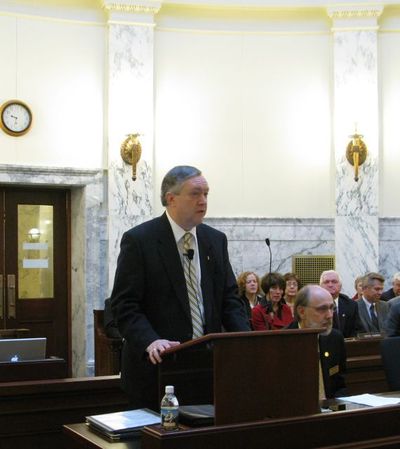UI president warns against further cuts

BOISE - The University of Idaho has taken $22 million in budget cuts just in the past two years, and with more looming, UI President Duane Nellis told lawmakers Monday that higher education is key to Idaho’s recovery from the current economic downturn.
“I’ve been on record as stressing higher education’s impact to the state’s economy,” Nellis told legislative budget writers, as he made his pitch for the university’s budget. “Higher education is even more important to Idaho when the state is facing these very significant economic difficulties.”
The tally of $22 million in cuts in two years doesn’t count another $10 million Gov. Butch Otter has recommended removing from a planned dairy research project, or millions more in additional holdbacks lawmakers are considering this year. For next year, the governor’s budget proposes $35.1 million less in funding for Idaho’s four-year colleges and universities combined, a 14 percent drop from this year’s budget, which itself was set at $32 million below the previous year’s budget, an 11 percent drop.
“These budget reductions do have an impact on our academic programs and on the state,” Nellis
said.
So far, the UI has discontinued 45 programs - eliminated 35 degree programs, and restructured 10 others. It’s also established four new ones in targeted areas, he said. There have been hiring and travel freezes, and the Moscow, Idaho-based university has cut 77 positions and deferred maintenance and equipment purchases.
This past fall, the university took a 6 percent budget hit thanks to the mid-year holdbacks Otter announced in September. Nellis said those cuts, which slashed $6.5 million out of the university’s spending for this year, were accomplished in part by tapping into the UI’s fast-shrinking reserves. But now, as Otter and lawmakers call for more cuts this year, the UI will have to turn to furloughs, he said, with top-paid employees facing as many as six unpaid days off between now and June 30, and lower-paid workers getting shorter furloughs.
So far, colleges and universities in Idaho have used “aggressive revisions to operating budgets … some elimination of positions and strategic use of reserve” to cope with budget cuts, state Board of Education President Paul Agidius told lawmakers. “However, as additional cuts and holdbacks are ordered, mandated cuts and furloughs may become necessary.”
That’s why the board is looking to give college presidents more flexibility to order such moves, Agidius said, a prospect that’s raised concern among tenured faculty. The state board will decide in February whether to allow that, Agidius said.
Looking ahead to next year, Nellis said, “We’re concerned about where we’re at, as far as the amount of dollars we’ve already cut in the university.” He said he’s optimistic about where the UI will be in two or three years, and his strategies include increasing enrollment, growing research funding, raising more private money, and expanding summer school and online offerings to help enhance the university’s financial position. “But these things take time to develop,” Nellis said. “The key is protecting what we have. I’m very concerned about taking further cuts from what we already have.”
Lawmakers weren’t particularly sympathetic.
Sen. Shawn Keough, R-Sandpoint, vice-chair of the Legislature’s joint budget committee, noted that many state agencies already have turned to unpaid furloughs for workers to deal with the state’s budget crisis. “Higher education is important, however they still only serve 30 percent of our high school students that graduate in Idaho,” Keough said, “So the challenge is to balance the value of higher education against the needs of the other items in the budget which serve a greater portion of our population.”
She noted, “They also have ability to raise a significant amount of funds elsewhere,” whether it’s from private fundraising, research grants or student fees.
Senate Education Chairman John Goedde, R-Coeur d’Alene, agreed with Keough. “Certainly there needs to be balance, and Sen. Keough is correct - there are going to be a limited percentage that will require a four-year degree, and everyone is going to require post-secondary education,” he said.
Goedde presided Monday over a joint meeting of the House and Senate education committees to hear presentations on the need to expand professional-technical education, including training in things like construction trades and welding. “This is part of that,” Goedde said.
Nellis said an economic impact study showed that last year, the U of I contributed nearly $1 billion to the state’s economy. “That’s almost 2 percent of the state’s economy,” he said.
“The University of Idaho must innovate in these challenging economic times,” Nellis said. “We’re doing just that. Our focus is on what we do best, making people successful, our students as they prepare for their lives as citizens and our staff and faculty as they share and advance knowledge that our students, state and world needs.”